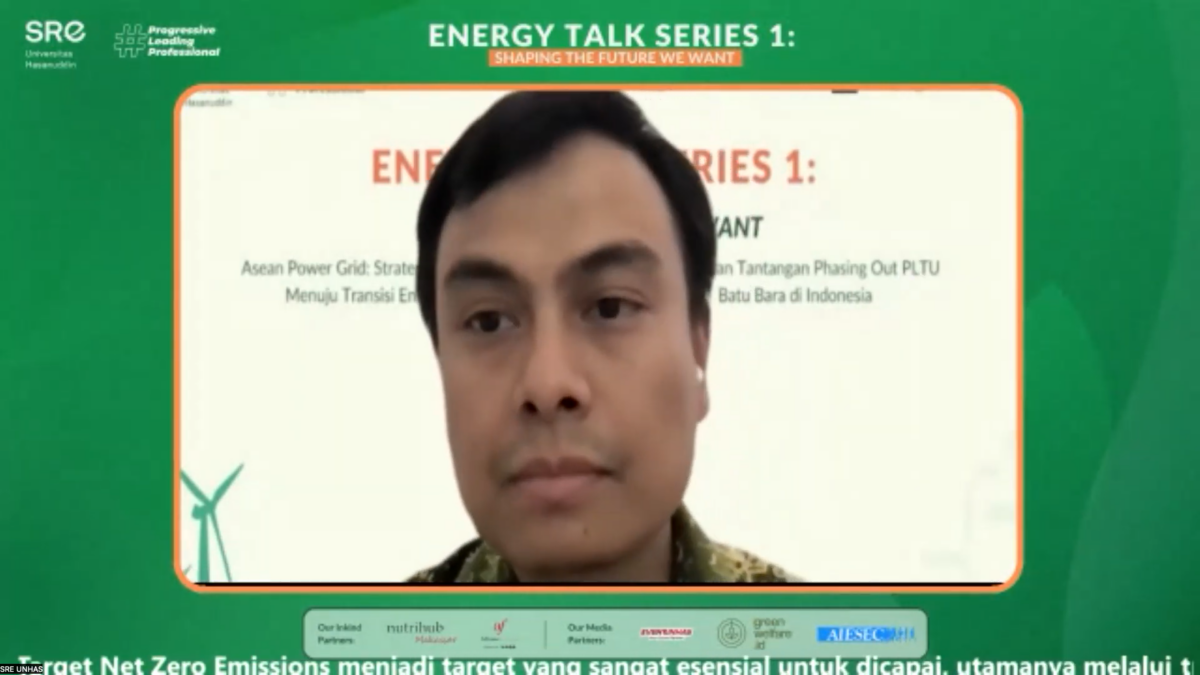Jakarta, June 24, 2023 – Raditya Yudha Wiranegara, Senior Researcher at the Institute for Essential Services Reform (IESR), explained several challenges in retiring PLTU and how renewable energy plays a role in shaping the future. This was discussed in the Energy Talk event held by the Hasanuddin University Society of Renewable Energy (SRE).
Raditya, or mostly referred to as Radit, opened the discussion session by explaining that human activities, especially in the energy sector, are the main contributor to the increase in earth’s temperature. The energy source is still dominated by coal and followed by consumption of fossil fuels. Radit considered this as work to be done for Indonesia, to start making plans to reduce dependence on coal-based power plants.
Furthermore, Radit points out that Presidential Decree 112/2022 regulates the acceleration of renewable energy development, and the third article contains a mandate for the Ministry of Energy and Mineral Resources (MEMR) to start making scenarios for accelerating retirement of coal power plants. There are also restrictions not to build coal fired power plants (CFPP) after this Presidential Decree is passed, except for those that are currently being planned, and those that are included in national strategic projects.
“The existing CFPP must also start reducing their emissions, until all are retired in 2045. However, this plan is still in dynamic discussion; the State Electricity Company (PLN) plans to retire CFPPs in 2030,” Radit explained.
Moreover, Radit mentioned , the benefits of early retirement from CFPPs are 2-4 times the cost that can be saved, based on an IESR study with the University of Maryland. Radit emphasized that these benefits include the benefits of health costs on air quality and reduced electricity subsidies that must be issued considering that our electricity is now subsidized. However, retiring coal-fired power plants includes several challenges, including the need for quite large upfront costs, around USD 4.6 billion by 2030 and USD 27.5 billion by 2050, which require substantial international support to achieve them. Second, USD 1.2 trillion is needed to replace PLTU electricity generation with renewable energy. Third, the legal aspect. Radit assessed that both PLN and independent power producers (IPP) have several scenarios that must be met in retiring their generators. For example, PLN needs to be investigated by an auditing agency if there is a loss to the state due to a reduction in the power plant, and the IPP can file a claim for the loss.
“From the results of the study we conducted, we found that in terms of mitigation costs, canceling the PLTU project is the most affordable option in reducing carbon emissions. Canceling will also avoid the big costs that will occur when you have to retire later, “said Radit.
Radit emphasized that with the Just Energy Transition Partnership (JETP) momentum, Indonesia must be able to catalyze more investments and build an attractive market climate in Indonesia for foreign investors. JETP is a climate change and energy transition funding partnership from the G7 countries plus Norway and Denmark for the development of electric vehicles, technology, and the early retirement of fossil-based power plants in Indonesia. This partnership also promotes an equitable energy transition that takes into account the lives and livelihoods of affected communities at every stage of the energy transition journey, so that no one is left behind. Indonesia has received an allocation of USD 20 billion to support the energy transition in Indonesia through the JETP framework.

